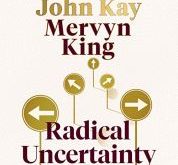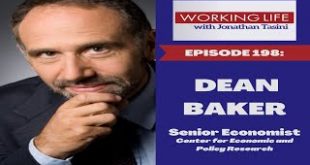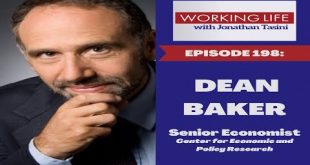from Peter Radford Today is quite an anniversary. It is fifty years since Milton Friedman’s article on the responsibilities of corporate management appeared in the New York Times. Whilst it was not the only argument in favor of the shift towards a narrow focus on shareholder value, it was certainly one of the more persuasive and influential. I have long held that Friedman’s reputation was ill-deserved because of his overt ideological bias and thus lack of any pretenses to scientific...
Read More »Does it — really — take a model to beat a model? No!
from Lars Syll Many economists respond to criticism by saying that ‘all models are wrong’ … But the observation that ‘all models are wrong’ requires qualification by the second part of George Box’s famous aphorism — ‘but some are useful’ … The relevant criticism of models in macroeconomics and finance is not that they are ‘wrong’ but that they have not proved useful in macroeconomics and have proved misleading in finance. When we provide such a critique, we often hear another mantra to...
Read More »New book from WEA Books
Public law and economics after the financial crisis Mstis Fernanda Madi, Renny Reyes, and Vicente Bagnoli (editors) Kindle Edition $5.89 – US UK DE FR ES IT NL JP BR CA MX AU IN Paperback $12.99 – US UK DE FR ES IT JP CA
Read More »Is this the end of globalisation (as we know it)?
from Karim Errouaki and WEA Commentaries The health, economic, social and political crisis created by the COVID-19 pandemic will reconfigure the geopolitics of international relations and globalization. We are only at the beginning of this crisis, particularly on the economic and social fronts. Many sectors, such as tourism, transportation and entertainment, will only recover over a very long time; many jobs will be destroyed. In contrast, other sectors are insufficiently developed and...
Read More »TRADE WARS AFTER CORONAVIRUS – WEA online conference
This conference is open for submissions SUBMIT YOUR PAPER Call for Papers The United States declared an economic war on China in early 2018. Economic warfare is a unilateral action that questions the existence of multilateralism and places the question of what regime we are about to enter after the weakening of the existing multilateral trade agencies. US trade policy opens the door for new relationships between emerging market economies and international financial institutions on...
Read More »Michael Woodford on models
from Lars Syll But I do not believe that the route to sounder economic reasoning will involve an abandonment of economists’ penchant for reasoning with the use of models. Models allow the internal consistency of a proposed argument to be checked with greater precision; they allow more finely-grained differentiation among alternative hypotheses, and they allow longer and more subtle chains of reasoning to be deployed without both author and reader becoming hopelessly tangled in them. Nor...
Read More »Pandemic Musings
from Peter Radford and WEA Commentaries I have been digging around a fair bit lately trying to understand the role of economics in the extent of the inequality being laid bare by the pandemic — more on that later. A few interesting nuggets worthy of a quick note popped out along the way. Thomas Phillipon opens chapter one of his recent book this way: “The big debates in economics are about growth and inequality. As economists, we seek to understand how and why countries grow and how...
Read More »Whoa! Does the Fed Really Care About Jobs…Finally? Dig into this with Dean Baker
SUBSCRIBE TODAY! The most important political figure in your economic life—to be sure, the boss of a company has got a lot of power—is not the president of the United States, no matter who that is. It’s probably the head of the Federal Reserve Board. We know interest rates are at historic lows and mortgage rates are crazy low because the Fed has intervened to keep the country from collapsing even further into the abyss we are in, an abyss Republicans in Congress...
Read More »Whoa! Does the Fed Really Care About Jobs…Finally? Dig into this with Dean Baker
SUBSCRIBE TODAY! The most important political figure in your economic life—to be sure, the boss of a company has got a lot of power—is not the president of the United States, no matter who that is. It’s probably the head of the Federal Reserve Board. We know interest rates are at historic lows and mortgage rates are crazy low because the Fed has intervened to keep the country from collapsing even further into the abyss we are in, an abyss Republicans in Congress don’t seem to care about....
Read More »Do ‘small-world’ models help us understand ‘large-world’ problems?
from Lars Syll In L. J. Savage’s seminal The Foundations of Satistics the reader is invited to tackle the problem of an uncertain future using the concept of ‘lottery tickets’ and the principle of ‘look before you leap.’ Carried to its logical extreme, the ‘Look before you leap’ principle demands that one envisage every conceivable policy for the government of his whole life (at least from now on) in its most minute details, in the light of the vast number of unknown states of the world,...
Read More » Real-World Economics Review
Real-World Economics Review





